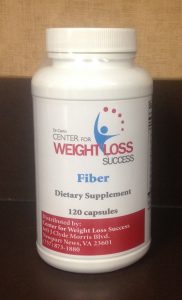Fiber is good. There’s no doubt in my mind. Is it as good as some people claim? The best thing about fiber is all the nutrition that it carries with it. The best fiber comes from food. The best fiber foods have no labels on them. Basically it’s the vegetable/salad stuff we prepare ourselves.
Most people don’t get enough fiber. It can help with bowel function. The best fiber foods are from salad and colorful vegetables. A lot of nutrients in there like vitamins and minerals. Eating clean is basically purchasing the food and preparing it.
Fiber foods are usually a mixture between soluble and insoluble. Soluble fiber means it dissolves in water. Insoluble doesn’t dissolve in water. It pulls water in. All plants have fiber. It’s the non-digestible part of the plant. We can only digest certain parts of plants. Fiber is everything else. I’ll give an example of carb blockers. Basically a carb blocker takes the digestible part of some of the plants, (carbohydrate), and makes the absorbable part non-absorbable. It acts more like fiber because fiber is a non-absorbable carbohydrate. Soluble fiber can be found in foods such as barley, nuts, seeds, beans, lentils, and fruits. Some of them are still very high in carbohydrate. Just because it may be “healthy” and contains fiber, doesn’t necessarily mean it’s going to help you lose weight. Eating healthy and losing weight are two different things. Fruit has a lot of fiber in it. Most of that is soluble fiber (mostly citrus fruits). Many vegetable have a lot of soluble fiber. They also have insoluble fiber. Insoluble fiber is a whole wheat/whole grain type of thing.
Fiber can potentially help with weight loss. It does tend to make us feel full, especially insoluble fiber because it pulls water in and swells. There are things out there sold as weight loss products. They’re fiber tablets that swell. There is something new coming out on the market. They’re little tablets that have microfibers that absorb water. They swell up and make you feel full. They break down again, and you just pass them through. In theory that can be very helpful. It’s working on that same principle that fiber itself makes you feel fuller, therefore fewer calories.
Fiber is a misunderstood nutrient
People often “know” fiber is important, but not much more than that. Fiber is found naturally in plants. It’s the non-digestible part of the plants. It’s the part of the plants that don’t break down in your intestines. They pass through your system undigested and end up as stool. The average person gets about 15 grams a day (25-30 recommended). Dietary fiber can be soluble or insoluble. Plants often contain both types. Both types are important and potentially have health benefits. The health benefit is probably the whole food that contains the fiber. Whether you’re getting the health benefit from fiber itself has never actually been proven.
Soluble fiber dissolves in water. Because it absorbs water, soluble fiber becomes a viscous gel and may slow absorption of other carbs and cholesterol products. It can also be fermented by the bacteria along the intestinal tract. We can’t digest the fiber. The fiber itself can be a good source of nutrition to the bacteria that live along our intestinal tract. That means that certain plants can potentially cause certain individuals more “gas”, bloating, cramping, and diarrhea. Some of this is because everybody’s microflora is a little different. Subsequently, if you have more of the bacteria that cause this bloating and cramping, you’re going to be more susceptible. Good sources of soluble fiber are: oats, dried beans, barley, flax seed, carrots, oranges, and apples. Again, a lot of these healthy foods don’t necessarily help you lose weight.
Insoluble fiber doesn’t dissolve in water. It absorbs water which increases bulk and softens stools and shortens intestinal transit time. It swells up like a sponge. It aids in constipation and diarrhea. Food sources for insoluble fiber: leafy vegetables, fruit skins, whole grain products, bran products, seeds and nuts. There’s a question of whether it can prevent cancer. Early studies say potentially it can. Later studies show there may not be anything to that. That doesn’t mean it’s not healthy.
Fiber supplements are different from fiber in food. The best fiber comes from real food. Almost all the studies done on high fiber diets were done on fiber-based foods. The question is whether the benefit came from the fiber or the healthy foods containing the fiber? Studies done on people taking fiber supplements don’t really show any benefits. Although, it does help with regular bowel movements. But does it actually improve other health benefits? Doubtful. Fiber supplements are made from “functional” fibers from plants. The two that are often used are inulin and oligofructose. These can act as prebiotics (what the bacteria live on). The prebiotics can stimulate the growth of the beneficial bacteria. Prebiotics means supplying the healthy bacteria with a good food source. The hope is that they will grow more and help you. It actually makes a lot of sense. Some of these supplements are: psyllium, guar gum, pectin, and cellulose. Many products just have different amounts of the soluble and insoluble fibers. You have to watch for abdominal gas/bloating, cramping and diarrhea. Then the question is can it bind with other nutrients preventing their absorption? You should take your medications separate from your fiber supplements. Fiber supplements have never been shown to have the same benefits as fiber-rich food.
What’s the real “poop”? Why did we think fiber was good to begin with? The original theory of fiber being good for us began in the 1960’s. Many disease processes were due not to the increase in processed sugar/carbs, but rather to the lack of fiber. Small studies supported this. In the 1970’s the “fiber hypothesis” became dogma, theorizing that fiber would prevent many of the world’s diseases: intestinal problems, weight, breast cancer, colon cancer, CHO, etc.… Between 1994-2006, long term studies involving over 180,000 people revealed NO beneficial effect on colon/breast cancer, heart disease or weight loss. The benefit is probably all the extra nutritional benefits come from high fiber foods, not the fiber itself. The belief that fiber is an intrinsic part of a “healthy diet” has been kept alive by factors that have little to do with science. The high fiber foods are nutritionally dense.
 The best fiber comes from food: leafy greens and colorful veggies. Don’t worry about the “kind” unless you are seeking a specific health benefit. Remember a few things if you’re taking fiber supplements. Start out slowly. Gradually increase the amount each day. Drink plenty of water. Some of the fiber pulls in the water. Spread the fiber out throughout the day. And, separate your fiber supplements from your medications. Realize that not all the implied “health benefits” are real. Nutrition benefits can be very real; the whole foods.
The best fiber comes from food: leafy greens and colorful veggies. Don’t worry about the “kind” unless you are seeking a specific health benefit. Remember a few things if you’re taking fiber supplements. Start out slowly. Gradually increase the amount each day. Drink plenty of water. Some of the fiber pulls in the water. Spread the fiber out throughout the day. And, separate your fiber supplements from your medications. Realize that not all the implied “health benefits” are real. Nutrition benefits can be very real; the whole foods.
 We carry fiber supplements in our CFWLS Nutritional Store as well – you can pick them up onsite or order online!
We carry fiber supplements in our CFWLS Nutritional Store as well – you can pick them up onsite or order online!








 Cat Keller has a wealth of experience in marketing, e-marketing, advertising and customer service and manages our Weight Loss Nutritional Store. She is always planning something fun and exciting. special events, discounts, giveaways – it’s never a dull moment. She is happy to help you with questions you may have regarding our products or services. Cat is a graduate of William & Mary, where she studied Government/Pre-Law and minored in Marketing.
Cat Keller has a wealth of experience in marketing, e-marketing, advertising and customer service and manages our Weight Loss Nutritional Store. She is always planning something fun and exciting. special events, discounts, giveaways – it’s never a dull moment. She is happy to help you with questions you may have regarding our products or services. Cat is a graduate of William & Mary, where she studied Government/Pre-Law and minored in Marketing.